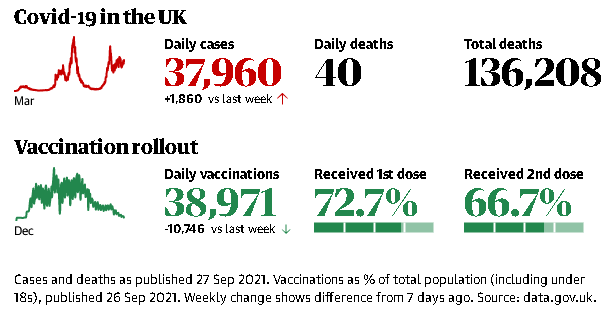
Hospitals in England relax Covid rules to help tackle waiting lists
Ministers have ordered a major relaxation of coronavirus infection control measures in England’s hospitals in an effort to make it easier to tackle the backlog.
The move follows a review, led by the chief executive of the UK Health Security Agency, Dr Jenny Harries, into whether the NHS could start to remove some Covid rules and enable medics to see more patients.
Currently, stringent guidelines designed to protect staff, patients and visitors from coronavirus, in place since the early part of last year, also make it harder to treat the rising numbers in need of elective care.
A record 5.6 million people in England are waiting for treatment, according to the latest NHS data.
Three key recommendations for elective care were accepted by Sajid Javid, the health secretary, on Monday. Each comes into force immediately.
They involve cutting social distancing from 2 metres to 1, dropping the need for patients to isolate before operations, and adopting “standard” rather than “advanced” cleaning procedures.
They are likely to prompt concern among some health professionals and scientists, as the virus continues to infect tens of thousands in the UK each day. Trisha Greenhalgh, professor of primary healthcare at the University of Oxford, said on Twitter that the relaxation of rules could “make things worse”.
Dr Simon Clarke, associate professor in cellular microbiology at the University of Reading, said the changes appeared “generally reasonable” and should be implemented where they can to “improve access to healthcare”. However, he warned that false negative test results could mean that “some asymptomatically infected patients will be put on wards with vulnerable patients”.

Clarke also said the new cleaning guidance “smacks of corner-cutting” and “may well lead to transmission of Covid-19 and other infections in our hospitals”.
The changes come hours after it emerged that the UK has joined a handful of countries to have fully vaccinated two-thirds of its population against Covid.
More than 44.7m second doses have been delivered in the UK, government figures show – the equivalent of just over 66.6% of the total population. Other countries to have passed this mark include Belgium, Canada, Chile, Singapore and Spain.
“As ever more people benefit from the protection of our phenomenal vaccination campaign, we can now safely begin to relieve some of the most stringent infection control measures where they are no longer necessary to benefit patients and ease the burden on hardworking NHS staff,” said Javid.
A new analysis by the Health Foundation warned on Monday that the waiting list is likely to “grow significantly”. It suggested that 7.5 million fewer people were sent for hospital care than expected during the pandemic.
While it is not clear whether all those will eventually come forward to seek help, the thinktank warned the waiting list will “continue to grow” over the next few years. Boris Johnson conceded this month that the backlog would “get worse before it gets better”.
Now fresh advice will be issued to hospitals over how they carry out elective care, Harries said, as more of the population is vaccinated and scientists understand more about how the infection is transmitted and how it can be contained.
The review says NHS staff working in areas where Covid control measures have been relaxed should be fully vaccinated, asymptomatic and not be a contact of a positive case.
“We have reviewed the existing Covid-19 evidence-based guidance and made a series of initial pragmatic recommendations on how local providers can start to safely remove some of the interventions that have been in place in elective care specifically for Covid-19,” said Harries. “This is a first step to help the NHS treat more patients more quickly, while ensuring their safety and balancing their different needs for care.”
The guidance will not apply to certain areas, such as emergency departments.
Patients preparing to undergo elective operations, such as hip or knee surgery, will no longer need to have a negative PCR test or isolate for three days before the procedure. Instead, patients in “low-risk” groups who are double vaccinated and asymptomatic will take a lateral flow test on the day.










